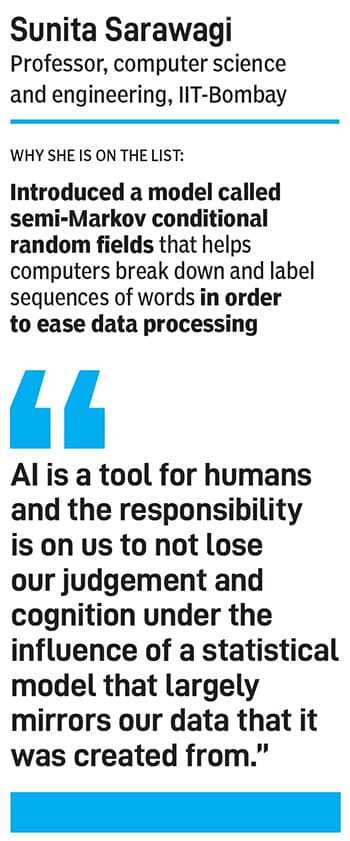Prof Sunita Sarawagi: Helping machines make sense
To unlock "the beauty of statistical machine learning", Sarawagi is a pioneer in building tools that help computers understand unstructured data, like text, images, videos, and numbers


In a rapidly changing world where data meets intelligence, Sunita Sarawagi has been contributing with research, teaching and application of artificial intelligence (AI) in many technological ideas and processes that make the world easier for humans. As a professor of computer science and engineering at IIT-Bombay for the past 26 years, she has not only shaped minds but also institutions, founding the Centre for Machine Intelligence and Data Science at IIT-Bombay.
Her work has garnered high honours in the discipline, including the Infosys Prize for Engineering and Computer Science in 2019, and recognition as a fellow of the Association for Computing Machinery. Sarawagi’s influence extends beyond research, with numerous award-winning publications and leadership roles in major conferences and journals, such as ACM Special Interest Group on Management of Data, and Neural Information Processing Systems.
Her journey began at IIT-Kharagpur, where she earned her bachelor’s degree, and then completed her PhD in databases from the University of California at Berkeley. Over the years, her work and research expertise have been used in some of the most prestigious institutions in technology and research, such as Google Research, Carnegie Mellon University and the IBM Almaden Research Center. Her current research interests are sequence models for text and time-series, domain adaptation, effective human intervention in learning, graphical models and structured learning.
 Like many of her generation, Sarawagi says that she chose computer science because of her good JEE rank. “I gradually gravitated towards AI over 30 years," she says. While working on data mining and cleaning, because of its relevance in data analysis, Sarawagi encountered conditional random fields (CRFs), which attracted her to “the beauty of statistical machine learning".
Like many of her generation, Sarawagi says that she chose computer science because of her good JEE rank. “I gradually gravitated towards AI over 30 years," she says. While working on data mining and cleaning, because of its relevance in data analysis, Sarawagi encountered conditional random fields (CRFs), which attracted her to “the beauty of statistical machine learning".
Sarawagi is a pioneer in building tools that help computers understand unstructured data, like text, images, videos and numbers that don’t follow a set format. In the past, computers mostly worked with neatly organised data, but as the world shifted, data became more and more unorganised. Sarawagi was one of the first to tackle this challenge with machine learning. Instead of using slow, manual methods that others had relied on, she introduced a smarter approach using a model called semi-Markov CRFs. This model helps computers break down and label sequences of words—for example, identifying names of cities or companies in a sentence.
Her work led to practical tools too. She and her team built a software package that is used by companies across India to better organise and structure address information. This tool helps businesses process large volumes of customer data more efficiently, enabling faster and more accurate services in sectors like ecommerce, logistics, and finance. Sarawagi’s contributions didn’t just stay within academic circles, but got translated into real-world impact too. By addressing the complexities of unstructured data at a time when few others were doing so, her research laid the groundwork for many future advances in making sense of messy, real-world information. Her influence continues to shape the field of machine learning and data science.
What describes Sarwagi best as a data science researcher is exploring unknown ways of understanding and harnessing data to solve our day-to-day problems. While she is not particularly proud of any of her contributions to AI and technology, and believes that most of them are okay and haven’t changed the field in a significant way, if asked to pick, she considers her CRF work to be most significant.
Sarawagi considers AI to be a useful tool for scientists trying to tackle grand challenges. “I view AI as a tool for humans, and the responsibility is on us to not lose our judgement and cognition under the influence of a statistical model that largely mirrors our data that it was created from."
On account of India’s progress in AI research, Sarawagi believes that we have a few researchers and few startups doing top quality work but we lose out in the volume game. “We need to set up AI innovation institutes that attract top talent, and retain them via freedom to do research. These could then spawn deeptech startups, or lead to technology transfer to industry," she says.
Professor Jayathi Y Murthy, president, Oregon State University, and jury chair, Infosys Prize in Engineering and Computer Science, who was part of the jury that selected Sarawagi for the award, views her as one of the leading researchers in statistical machine learning for information analysis, extraction and integration. “She was one of the earliest researchers to develop novel machine learning techniques for extracting information from unstructured data, such as that found on the world wide web. The applications of her work are broad and very useful."
First Published: Jun 24, 2025, 10:49
Subscribe Now